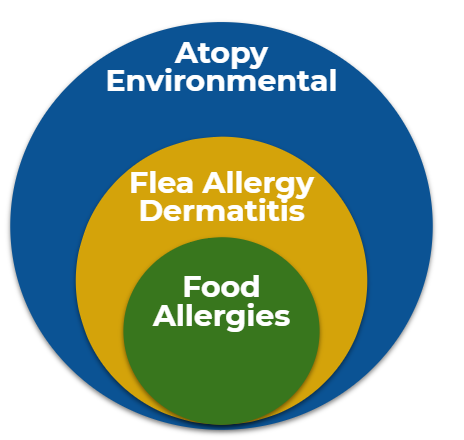
*Advertorial: Hill's Pet Nutrition
What are the most common skin allergies in pets?
The most common skin allergies in dogs and cats are to things in their environment such as dust mites, pollens and grasses. These skin allergies manifest as itching and scratching, causing red, inflamed and damaged skin, a condition which is called atopy, or atopic dermatitis. Another common allergy is to fleas, which, predictably enough, is called flea allergy dermatitis. These are the big two skin allergies seen in dogs and cats throughout Australia and New Zealand and we typically see them seasonally - but some (such as dust mites) can be seen all year round. Allergies to food, while also a possibility for causing skin reactions, are actually much less common than atopic dermatitis and flea allergy dermatitis, making up only 10-15% of all skin allergies[1] and typically occur all year round.
This may surprise many pet owners, given all the focus food allergies are given in the media! It may also come as a surprise that, despite common belief, grains are rarely the cause of food allergies and most often the allergy is to an animal protein with beef, dairy and chicken being the most common allergens in dogs and beef, dairy and fish for cats.
What are environmental allergies?
The reason some animals suffer from environmental allergies is that they have a defective skin barrier which is an inherited disorder. Allergens, such as pollens pass through the skin (unlike in us where we inhale the allergens and typically get hayfever) which causes an allergic reaction. Moisture can also be lost through this defective barrier, causing the skin to be dry. This in turn makes the pet feel itchy and they scratch and lick their skin, causing further damage. An analogy you may want to think about is treated/oiled wood on a deck vs an untreated, undressed deck which represents a defective skin barrier.
While any breed can suffer from environmental allergies, there are some breeds which are more likely to have skin problems such as Golden and Labrador retrievers, German shepherds, English bulldogs, Boxers, Pugs, Boston terriers, Shih tzus, Miniature Schnauzers, and my first dog (which suffered badly from environmental allergies): West Highland white terriers[2].
More about food allergies
For pets to be allergic to a food they must have eaten it previously in order to become sensitised to it. When the food is eaten repeatedly their immune system mounts an allergic response. A pet may have eaten the same food for months or years and then develop an allergy to it. A pet can develop an allergy to any protein fed commonly.
Food sensitivities or intolerances are quite different to food allergies in that they don’t involve the pet’s immune system. Collectively, food allergies and food intolerances are called adverse food reactions, and may result in gastrointestinal problems or skin problems, or both. Gastrointestinal signs may include loose stools, increased stool frequency, flatulence and sometimes vomiting and diarrhoea. Skin signs can mimic many other types of skin disease and can include itchiness around the face and paws, ear infections and can also be generalised over the entire body.
How are adverse reactions to food diagnosed?
Unfortunately there is no blood or skin test to rule food allergy in or out. The only way to make a diagnosis is to do a food elimination trial, which involves feeding a diet made up exclusively of ingredients the pet hasn’t eaten before. In addition to looking at all the ingredients in the regular food, all treats or flavoured medications/wormers, etc. a pet may have consumed (particularly within the previous 6 months) need to be taken into account. Your veterinarian will advise what is the best food for your pet to be on during the diet trial.
Hill’s new diet for managing both environmental and food sensitivities in dogs
Hill’s latest skin care diet, Prescription Diet Derm Complete, is a breakthrough for Hill’s in the management of skin conditions in dogs, because it has been clinically tested to help manage both food and environmental sensitivities.
Derm Complete contains nutrients such as omega 3 and omega 6 fatty acids to help strengthen the skin barrier, as well as an optimal blend of vitamins and minerals to help nourish the skin and coat. Derm Complete also contains Hill’s proprietary blend of ingredients and nutrients, including phytonutrients from fruits and vegetables to help support skin function in dogs with environmental sensitivities.
Derm Complete can also help manage food sensitivities because it contains a single source of protein, egg, which rarely causes adverse food reactions in dogs, making it a great long term solution for dogs with food or environmental sensitivities, or both.
Skin conditions can have a wide range of causes and require veterinary expertise for an accurate diagnosis and appropriate treatment. Be sure to consult your veterinarian about your pet's individual health and treatment options.

[1] Mueller RS, Olivry T, Prélaud P. Critically appraised topic on adverse food reactions of companion animals (2): common food allergen sources in dogs and cats. BMC Vet Res. 2016;12:9.
[2] Miller WH, Griffin CE, Campbell KL, eds. Hypersensitivity Disorders. In: Muller and Kirk’s Small Animal Dermatology 7th ed. St. Louis, MO: Elsevier; 2013:372

